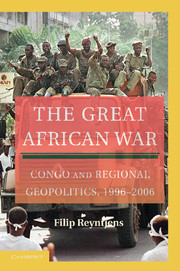Book contents
- Frontmatter
- Contents
- Acknowledgements
- List of Maps
- Introduction
- 1 A Region in Turmoil
- 2 The ‘War of Liberation’
- 3 Massacre of the Rwandan Refugees
- 4 The Fall of the Mobutist State
- 5 Congo: Waiting for Another War
- 6 Impasse in Rwanda and Burundi
- 7 ‘The First African World War’
- 8 Negotiating the Transition
- Conclusion
- Appendix 1 Sources on the killings of Rwandan refugees in early 1997
- Appendix 2 Chronology
- Appendix 3 List of abbreviations
- References
- Index
6 - Impasse in Rwanda and Burundi
Published online by Cambridge University Press: 18 December 2009
- Frontmatter
- Contents
- Acknowledgements
- List of Maps
- Introduction
- 1 A Region in Turmoil
- 2 The ‘War of Liberation’
- 3 Massacre of the Rwandan Refugees
- 4 The Fall of the Mobutist State
- 5 Congo: Waiting for Another War
- 6 Impasse in Rwanda and Burundi
- 7 ‘The First African World War’
- 8 Negotiating the Transition
- Conclusion
- Appendix 1 Sources on the killings of Rwandan refugees in early 1997
- Appendix 2 Chronology
- Appendix 3 List of abbreviations
- References
- Index
Summary
Between the two wars, some phenomena were common to both countries: the continuation of the civil war in Burundi, its spread and intensification in Rwanda; widespread violations of civil rights, especially the right to life; the impasse in which the judicial systems found themselves; economic regression due to the enormous budgetary constraints imposed in part by defence efforts, insecurity and, for Burundi, sanctions; poor political governance; and finally, the prevailing atmosphere of fear and distrust. Other characteristics were peculiar to each country. Thus, in Burundi, and not in Rwanda, the paths for political dialogue remained open, even if they were full of pitfalls. The Rwandan government, for its part, opted for a military and police mode of management of political space, even beyond its borders. Another difference was to be found in the attitude of the international and regional communities: while Burundi was relatively isolated, the authorities in Kigali continued to benefit from the ‘genocide credit’, even if it was slowly eroding. Finally, Rwanda, contrary to Burundi, claimed a role as a regional power, acquired as a result of its military successes in the Congo, but the country remained fragile and potentially destabilising for itself and its neighbours.
THE CIVIL WARS
As seen earlier, Burundi's civil war began as the coup d'état of October 1993 continued in a creeping manner, thereby bringing to a ‘negotiated’ end the 1993 elections and the 1992 constitution. Faced with this evolution, whose first signs were already noticeable in early 1994, some leaders of the elected majority chose to go underground and created the National Council for the Defence of Democracy (CNDD) as well as its armed wing, the Forces for the Defence of Democracy (FDD).
- Type
- Chapter
- Information
- The Great African WarCongo and Regional Geopolitics, 1996–2006, pp. 170 - 193Publisher: Cambridge University PressPrint publication year: 2009



